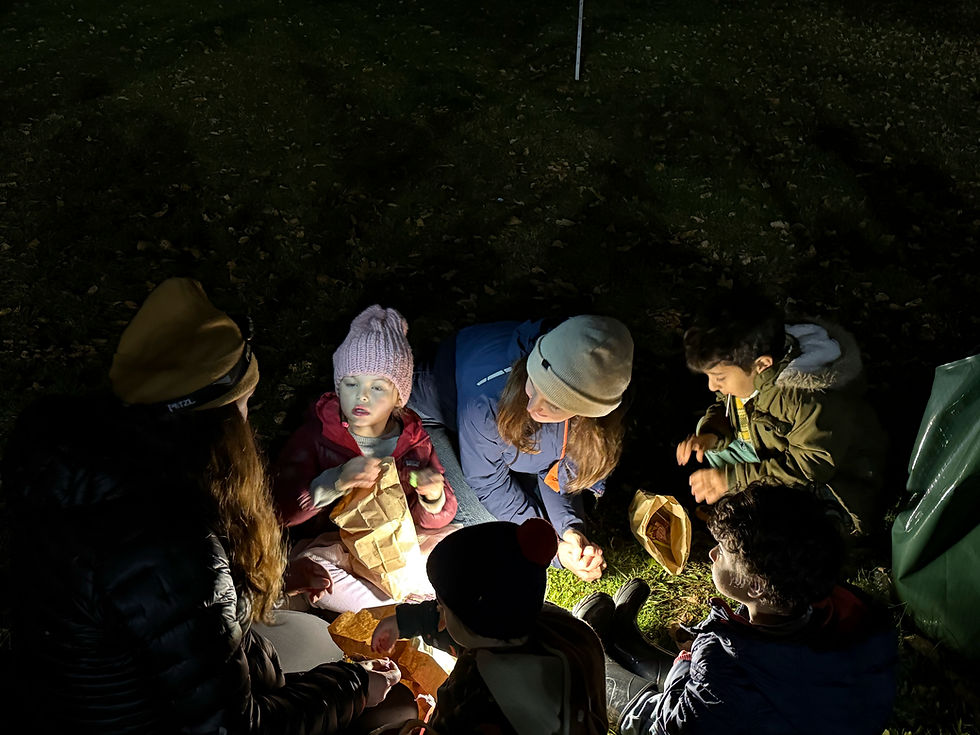Orienteering in Math
- Barb Bryant
- Feb 3, 2024
- 3 min read
November 14, 2023: It is a chilly fall morning on the soccer field behind the Florida Ruffin Ridley School in Brookline, MA and the culmination of three weeks of work by the 7th grade. This year, math teacher Victoria Cavanaugh has begun to work orienteering into her curriculum. In the sport of orienteering, participants use a map and compass to navigate their way through a series of checkpoints.
The 80 students first learned basic orienteering skills and related them to principles in math, such as scaling and shape transformations. Ms. Cavanaugh engaged Navigation Games, a Boston area nonprofit with an educational mission, to provide the initial orienteering training. Indoors, the math classes worked on finding checkpoints using a “clue sheet”, orienting a simple map with checkpoints laid out in a geometric pattern, and using an electronic timing system. Outdoors, they navigated to nearby Griggs Park with a street map. At each checkpoint, they answered a multiple-choice question, such as “what is the serial number on the mailbox?”
Griggs Park itself had been previously mapped via the Orienteering USA Youth Mapping Program for the Public Schools of Brookline. The map was funded partly by grants from Orienteering USA and the Brookline Education Foundation. At the park, the math students did a series of exercises, including Poison Score-O (visit ONLY the checkpoints shown on your map, in any order), and regular orienteering courses using electronic timing. Now that the students were experienced orienteers, it was time for them to become mappers and course-setters.
Over the following weeks, they worked in groups to create their own maps of Florida Ruffin Ridley’s park, labeling fields, paths, and fences, as well as pace counting distances to correctly scale down the park. Finally, each team used their map to design their own orienteering course.

And today is the grand finale! The 7th grade has barely finished setting up streamers at their control locations as the 3rd and 4th grade classes begin pouring out of the school. Split into groups, the elementary schoolers line up to take the homemade maps, and, using the skills built in their recent maps unit, search for the controls. At each control, the younger students encounter a joke, noting the punchline to track their progress, and getting some giggles — or groans — in the process. When teams got stuck, 7th graders happily swooped in to help them find their way to the next control, keeping the kids moving, engaged and having a great time.
During the activity both the younger orienteers and the 7th grade course designers showed an impressive degree of orienteering skill. Navigation Games leader Jackson Codd was impressed by the 3rd and 4th graders’ ability to relate the hand drawn top-down maps to the park they were standing in. The event was a great success, and Ms. Cavanaugh hopes to host it again next year. This was the first time that she tried the activities and she plans to make changes to make the event easier to run and more sustainable. She is also thinking about reaching out to other middle school math teachers to see if they’d like to involve their classes as well. She and Navigation Games will be presenting her orienteering curriculum at a Massachusetts math teachers’ conference in March.
Ms. Cavanaugh says: “Orienteering is a wonderful way to move beyond the classroom confines and introduce students to new skills such as map reading, while at the same time allowing students the chance to apply their math and teambuilding skills in practical situations.”
Article by Jackson Codd




Comments